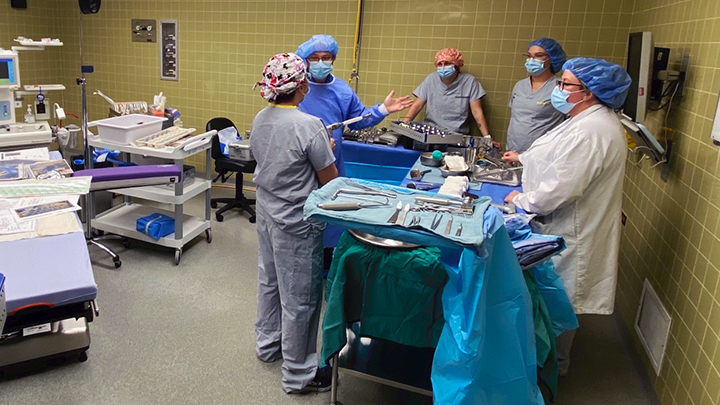
February 21, 2022

More Licensed Practical Nurses (LPNs) are showing up in the Operating Room as they work to their full scope of practice and apply their full competencies, knowledge and skills as outlined within provincial licensing guidelines. Photo supplied.
Story by Janine Poersch
EDMONTON — Kelly Annesty remembers the moment 23 years ago when she first learned that Licensed Practical Nurses (LPNs) could work in operating rooms (ORs).
“I would always wonder what was happening down the hall,” says Annesty, who was then working as an OR unit clerk in Nova Scotia. “One day I saw a nurse who had LPN on her job badge, so I asked what she did in the OR, because I had no idea LPNs could do that.”
In that moment, Annesty’s future started a seismic shift.
“I kept thinking about it, and then decided that was exactly what I wanted to do — so I became an LPN through a program in Nova Scotia.”
In 2008, Annesty moved to Alberta to work as a LPN on a stroke/geriatric unit at the Royal Alex. Shortly afterwards, she heard about a pilot perioperative education program at AHS that would help land her in the OR. LPNs need additional credentials to work in the OR. This involves specialized training that supports their working to full scope, which includes (but is not limited to): scrubbing with the surgical team, assisting anesthesia with the patient, and assisting the scrub team during a surgical case.
“We learned all the basic skills from prepping and draping to how to properly take care of and clean instruments,” she says. Annesty was able to continue working while learning, making the program “a perfect match”.
After successfully completing the program, she stepped into her new role as an OR LPN at the Royal Alex. For 15 years, she has continued to learn and grow in her role, and today advocates for LPNs to work to their full scope in the OR.
“I did a lot of competency reviews with the College of Licensed Practical Nurses of Alberta (CLPNA),” says Annesty. “We made sure that LPNs who were hired within the Royal Alex were working to their full scope and felt competent to do so.”
Additional education is provided whenever it’s needed, Annesty adds. Working to full scope empowers nurses to apply their full competencies, knowledge and skills as outlined within provincial licensing guidelines. Annesty adds that many of the LPNs she meets are surprised to learn they can work in the OR.
“The opportunities in the OR are endless and dynamic — you’re constantly learning and doing different things,” says Annesty. While different from bedside nursing, it can be equally satisfying.
“The most rewarding thing is being able to see instant results after a patient goes through surgery,” says Annesty. She recalls one case where a patient came in with a curved C-shaped spine. By the end of the surgery, the patient’s spine was straight.
After 15 years as an LPN in the OR, Annesty recently handed her resignation letter to the same manager who hired her in 2008. Today, Annesty is a Connect Care credentialed trainer for healthcare roles within perioperative settings, from unit clerks and registered nurses to perfusionists and anesthesia assistants.
Annesty enjoys her new educator role as she provides at-shoulder support during Connect Care launches, helping teams to transition their workflows and address issues.
While Annesty admits that she misses the OR every day, she also appreciates the new things she sees and experiences in her latest role.
“I truly feel valued and like my advice matters. I also get to be people’s biggest cheerleader.”